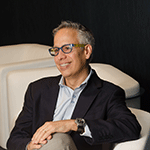Munich, Germany is a long way from Tucson, AZ, but Ben Ostapuk has made the journey look seamless. Ostapuk first left Tucson for Cornell University in the fall of 1989 and completed his degree at the University of Arizona before earning his law degree from Stanford. Being of Mexican and Polish descent, Ostapuk says he got a mix of the best of his parents, giving him the ability to stand in two very different worlds. “I’ve been able to fuse that into being comfortable in a wide range of environments and diverse groups of people,” he says.

New technologies and the rate of innovation have created challenges as well as opportunities throughout Ostapuk’s career. His skill set, background, and pedigree have made him an invaluable asset to Intel Corp. in Europe. Currently senior litigation counsel for the semiconductor chip maker, he plays a significant role in shaping Intel’s approach to a quickly changing legal landscape. With an update on the world of tech litigation, Ostapuk discusses with HE disruptive innovation, emerging markets, and his role as a multicultural conduit for Intel.
What major issue are you dealing with currently for Intel?
The current hot-button issue in litigation has to do with patents that are essential to industry standards, particularly in the wireless communications area (such as Wi-Fi and 4G). There’s a whole host of issues about what kind of commitments people make when those standards are being developed and how that impacts enforcement of those patents later on.
What sort of case would be an example of that issue?
The international Apple v. Samsung lawsuits are an example. In these cases, a component of portable devices (tablets and phones) providing standardized functionality was alleged to require certain patents. By asserting those patents, a plaintiff attacks a whole tablet or smartphone, arguing in court that they are owed high damages based on the consumer product sales price.
How does this relate when considering tech creation in emerging markets like India or China?
Courts and regulatory bodies all over the world are in the process of deciding what rules apply to this specific type of patent litigation. For the last three years, patenting and patent laws have been discussed and developed all over the United States and Europe, and we’re starting to see movement on these issues in places like India and China as well.
Intel is one of the bigger players in the market. How does that affect your job?
Currently, it makes us a defendant more than a plaintiff. We’re definitely focused on bringing great products to market, but, at the same time, Intel is one of the largest holders of patent rights in the world, and we must also protect Intel’s intellectual property rights.
In what ways has your background played to your advantage in working abroad?
My Latino heritage has certainly been a huge help, just by having a higher degree of cultural awareness. My listen-first approach and willingness to hear what people are saying is also very helpful. Being a relationship builder and a warm, friendly person has helped me get people to listen to one another and find a solution that they might not have found on their own.

